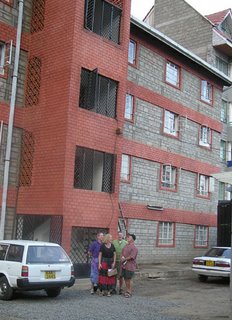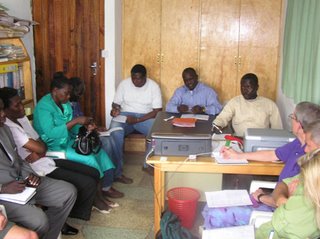Big day today. Bigger than I would have imagined. This was the day where we visitors from Missouri were to meet with representatives of the Diocese of Lui and some others the Bishop would invite. I expected it might be maybe us five Missouri visitors with Bishop Bullen and a couple of others from the Diocese of Lui. But no! There were at least 10 people from Lui in that close, hot room with us.
 The Episcopal Diocese of Sudan maintains offices in this Nairobi building. Several other groups -- currently expatriated from Sudan -- also have space in this building, including the Roman Catholics of Sudan.
The Episcopal Diocese of Sudan maintains offices in this Nairobi building. Several other groups -- currently expatriated from Sudan -- also have space in this building, including the Roman Catholics of Sudan.In that very hot room with no breeze blowing [Did I mention it was hot?], these ten (or so) people from Lui explained their situation and talked with us about their needs. Others in the meeting surely took more thorough notes than I did. They impressed me with the depth of their needs and the urgent need for us to bring assistance as soon as possible.
This is a shot of about half the group:

I think all – or least most – of these folks had moved from Lui to Nairobi. But that does pose a question and a challenge. When war came to Lui, many folks fled. I’m not sure what was involved in that flight. But I do sense – and so did others in our mission group – that the people back in Lui are starting to feel irritated by these people who are still hanging-out in Nairobi and other cities outside Sudan. While the Moru in Lui are suffering without power, water, or food, their compatriots – and some of the leaders of the non-governmental organizations – are living in Nairobi where they have vehicles, refrigeration, air-conditioning, power, and – more importantly – food, water, and schools. I sense that it’s the “elite class” and the educated people that fled to Nairobi and beyond when civil war began devastating Lui. But now – if Lui is going to be rebuilt – they really need to go home to Lui. But what would you do? Especially if you had children. Would you leave the relative comfort and safety of Nairobi to go home to the primitive conditions in Lui? I hope I would, but I can’t be sure. What will they do? And how can re-building really take hold in Lui if the more educated and affluent people don’t go home? There are no easy, facile answers to those questions. But they are the questions that we began to raise in our meeting with the “Lui leaders” in this session.
One of the men –with the Sudan Humanitarian Service – made a powerful statement in that regard. He said, “You see us here today in suits and ties, but we are refugees.” His comment hit home for me. These guys [and, yes, most of them in that session were men] have done their best to survive. But they do still feel homesick for Lui. They want to go home, and they want to help their people.
Education is a huge issue. Several of the Lui leaders mentioned it. There’s a terrible shortage of schools, and a problem with the quality of education offered in the few schools there are. One man mentioned that only 27% of school-age children in Lui are able to attend school. That’s a problem that we can and should address.
Health care is another big issue. Lui is fortunate to have the Samaritan’s Purse Hospital located there - -and thanks be to God that it’s there! But the travel logistics are so primitive that it takes many, many hours to carry a person to the hospital – carried on a person’s back, or maybe (if you’re lucky) on a bicycle. Strangely, transportation is the key issue that stands between the Moru and reasonable health care. There should be a way to deal with this!
Millennium Development Goals. This was strange to me. As an American, up to that time, I had heard very little about the UN’s MDGs. But a majority of the speakers that day spoke of the MDGs … what they promise … what needs to be done to achieve them in Sudan. Thanks be to God, and thanks to Michael Kinman, the Episcopal Church this year made a strong commitment to the MDGs. I hope their benefits will finally begin to make a significant difference in the lives of the people of Lui.
Agriculture. Several folks spoke about these problems. They recognize the soil is depleted. They’re getting sparser yields using the current, traditional methods and tools, but aren’t sure how to improve the situation. They have a desire to explore “agri-business” as a way to provide food sufficiency in Lui and generate income for the Diocese and the people, but not sure how to proceed. For instance, they have lots of mangoes, which arrive all at once, but many go to waste because they have no way to preserve or transport them. They sense there may be export options, but don’t even know how to begin exploring those.
It was somewhat overwhelming to hear all these people – one after another – list their needs, hopes, and problems. I wish had wise words to say here. But I don’t. I don’t feel we got any resolution about all these issues, nor that we charted a way that our companion relationship can move things forward. That was sad. Desperately disappointing. I just hope our diocese -- and the many other Episcopal dioceses and humanitarian groups operating in Sudan -- can begin to provide significant, sustainable development before the people of Lui despair or die.




No comments:
Post a Comment